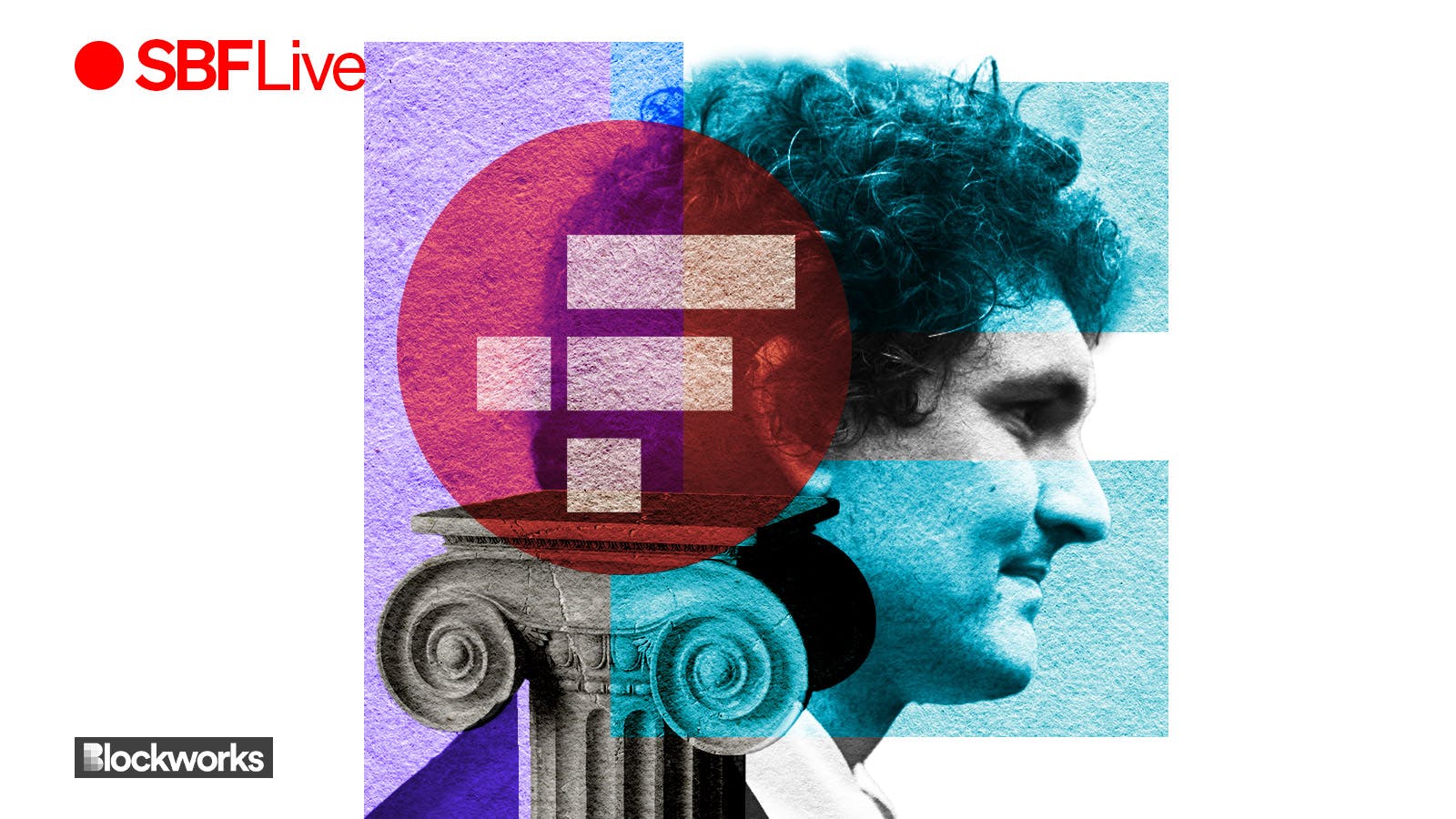White-collar defense lawyer weighs in on SBF trial: ‘If I had to place a wager…’
Prosecutors have “smart strategy” of using witnesses to drive a narrative with “elements of ambition and romance and betrayal,” law partner tells Blockworks

Artwork by Crystal Le
Federal prosecutors have come out swinging in their case against Sam Bankman-Fried, a route one white-collar defense lawyer believes could pay off.
Jack Sharman, a partner at law firm Lightfoot, Franklin & White, told Blockworks that the prosecution’s decision to put former Alameda Research CEO Caroline Ellison on the stand early — rather than getting too deep in technical groundwork — was a “smart strategy.”
Ellison, who admitted to defrauding FTX customers and lenders, agreed to be a key witness for federal prosecutors. She testified this week that Alameda took roughly $14 billion from FTX customers, adding that Bankman-Fried “directed me to commit these crimes.”
She noted that she began an intimate relationship with Bankman-Fried in 2018 after joining Alameda as a trader.
“If you have a narrative that is more human, that is compelling, that involves elements of ambition and romance and betrayal and you’ve got good witnesses for that, you should lead with that,” Sharman said. “That seems like what they’re doing and obviously we’ll see how effective that is, or not.”
Sam Bankman-Fried faces seven federal charges, including wire fraud and money laundering. He had faced a maximum sentence, if convicted on all counts, of 115 years before prosecutors dropped a campaign finance charge. Bankman-Fried pleaded not guilty.
“If I had to place a wager right now, it’s still early days but I think I’d bet on a conviction,” Sharman said.
Read more: BlockFi’s ex-CEO back on the stand: Sam Bankman-Fried trial live updates
The lawyer — special counsel to the Georgia Secretary of State relating to inquiries into the 2020 presidential election — pointed to the reported treatment of defense attorneys by Judge Lewis Kaplan as one of the reasons Bankman-Fried appears to face an uphill battle.
As Christian Everdell, a lawyer on Bankman-Fried’s legal team, cross-examined witness Adam Yedidia last week, Kaplan told Everdell: “You’re wearing out your welcome on repetition.”
Kaplan has also shot down a vast majority of the defense’s objections, while quickly sustaining many by prosecutors, according to Blockworks reporters inside the courtroom.
“If the judge in front of the jury undercuts whatever you’re doing…a lot of times the jury takes that as a signal from the judge that somehow the defense lawyer is not to be believed or is doing something wrong,” Sharman explained.
Read more: Is Sam Bankman-Fried’s defense dropping the ball?
Keep reading for more excerpts from Blockworks’ interview with Sharman.
Blockworks: What do you expect from the defense’s strategy going forward?
Sharman: The defenses that I’ve read about are cognizable, real defenses — things like…subordinates who have discretion have done things that I didn’t endorse or know about.
[That’s a] real, legal and factual defense and it often comes up in white-collar cases. But there are also problems with that. I think often jurors tend to be skeptical of a CEO — the boss — saying well my subordinates really caused this problem and I was sort of deceived as much as anyone.
Unless there’s some real evidence I think you can bring out on [cross-examination] to establish that, I think most jurors don’t like that.
Blockworks: Could Bankman-Fried take the stand?
Sharman: This defendant seems like a very talkative person. Very confident, very articulate, obviously bright. And he may think his only chance is to get on the stand and sow enough reasonable doubt that [he] can get at least one juror on his side.
I think most defense lawyers would prepare the client as best they can to testify, but would actually make the decision, or the recommendation, during trial and really after the government rests.
You see what they’ve got and try to discern how well or poorly they have done, because…there are substantial risks to any white-collar defendant testifying. I think all things being equal, most experienced white-collar lawyers would say if I can avoid putting my client on the stand, I would counsel that.
Blockworks: Bankman-Fried was not offered a plea deal, according to prosecutors. Is that surprising to you?
Sharman: He is the apex defendant in this organization — he’s the CEO and most visible individual — and certainly the one the government feels is most culpable.
If they feel like they have a case that’s buttressed not only with documents but with two or three cooperators who are going to be presumably articulate, knowledgeable insiders, they may see there’s no point in it. We want to go to trial, we want to make a point and we want to maximize the potential sentence.
Blockworks: If convicted, what kind of sentence do you expect Bankman-Fried could get?
Sharman: Mr. Bankman-Fried, like most white-collar defendants, has zero criminal history. So the relevant factor is loss [amount], and that’s what drives sentences sometimes sky high.
I would expect that because of those amounts, the guidelines range would be very high to begin with and that the government would argue pretty vigorously that a sentence at the high end of the guidelines range is appropriate.
Interview excerpts were edited for brevity and clarity.
Get the news in your inbox. Explore Blockworks newsletters:
- The Breakdown: Decoding crypto and the markets. Daily.
- 0xResearch: Alpha in your inbox. Think like an analyst.






